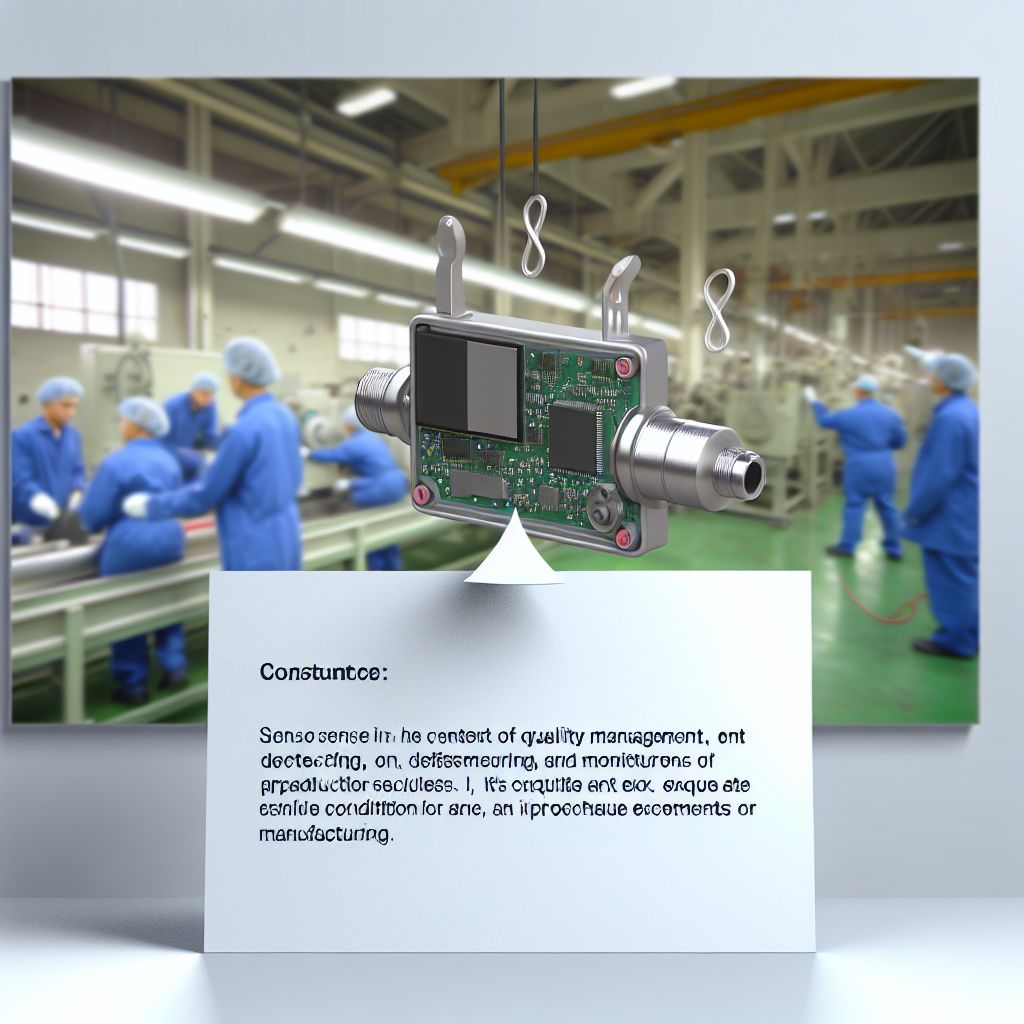Sensor in the quality management context refers to a device or component used to detect, measure, and monitor various physical parameters or conditions in a production or manufacturing process. Sensors play a crucial role in quality control and assurance by providing real-time data and feedback, allowing organizations to maintain consistent product quality and optimize their processes. These devices are employed across multiple industries to ensure that products meet specified quality standards.
Application Areas of Sensors in Quality Management:

-
Manufacturing Industry: Sensors are extensively used to monitor variables such as temperature, pressure, humidity, and quality during the manufacturing of goods, ensuring product consistency.
-
Automotive Sector: In automotive manufacturing, sensors are employed to measure dimensions, detect defects, and monitor the performance of critical components like engines and transmissions.
-
Food Processing: Sensors help maintain food safety and quality by monitoring parameters such as temperature, pH, and moisture content during food processing and packaging.
-
Pharmaceutical Production: Sensors play a vital role in pharmaceutical quality control by monitoring and recording data related to chemical processes and ingredient concentrations.
-
Environmental Monitoring: Environmental sensors are used to assess air and water quality, detect pollutants, and ensure compliance with environmental regulations.
National and International Examples of Sensors in Quality Management:
-
Quality Control Sensors: These sensors are deployed on production lines to inspect products for defects, ensuring that only items meeting quality standards are released.
-
Temperature Sensors: Commonly used in various industries to monitor and control temperature, ensuring that products are manufactured under the appropriate conditions.
-
Pressure Sensors: Essential for maintaining the integrity of sealed products, pressure sensors help detect leaks and ensure proper packaging.
-
Proximity Sensors: Used in automated manufacturing processes to detect the presence or absence of objects and trigger specific actions.
-
Chemical Sensors: Employed in laboratories and production environments to monitor chemical reactions, identify substances, and ensure product quality.
Risks Associated with Sensors in Quality Management:
-
Sensor Calibration: Incorrect sensor calibration can lead to inaccurate measurements and compromised product quality.
-
Sensor Failure: Sensor malfunctions or breakdowns can result in the production of substandard goods or process disruptions.
-
Data Security: Ensuring the security and integrity of sensor data is essential, as unauthorized access or data tampering can impact product quality.
-
Cost of Implementation: Integrating sensor technology can be costly, especially for small businesses, which may pose financial challenges.
Historical Perspective and Legal Basics:
The use of sensors in quality management has evolved over time, driven by advances in technology and the need for increased precision and consistency in manufacturing. Various international and national standards and regulations may apply to the use of sensors in specific industries, ensuring that quality and safety standards are met.
Examples of Sentences:
- The temperature sensor in the oven ensures that the baking process maintains the desired temperature range.
- Quality control relies on the accuracy of the sensors used to detect defects and deviations in the production line.
- Regular sensor maintenance and calibration are essential to prevent inaccurate measurements.
- The environmental monitoring system employs a network of sensors to assess air quality in real time.
- The sensor's data revealed fluctuations in pressure, prompting immediate adjustments to the manufacturing process.
Similar Terms or Synonyms:
- Monitoring device
- Measuring instrument
- Detection component
- Sensing equipment
- Analytical instrument
Summary:
In the realm of quality management, a sensor is a fundamental device used to detect and monitor various physical parameters and conditions in manufacturing and production processes. These devices are essential for ensuring product consistency, quality control, and process optimization across diverse industries. By providing real-time data and feedback, sensors play a vital role in maintaining quality standards and enhancing overall operational efficiency.
--

